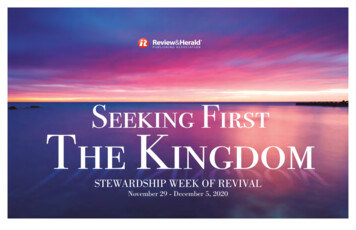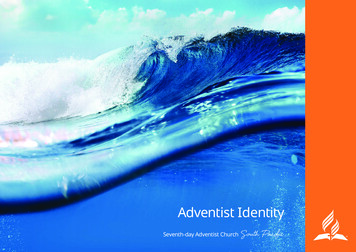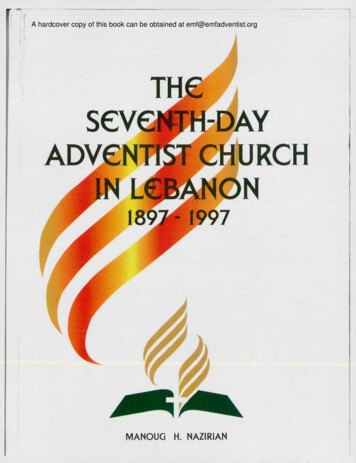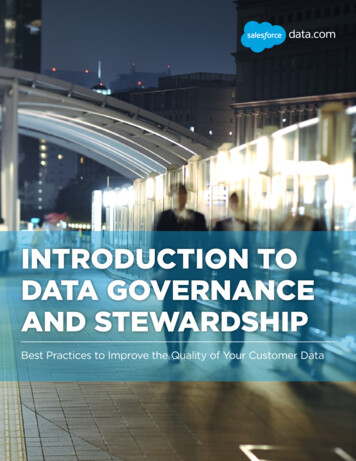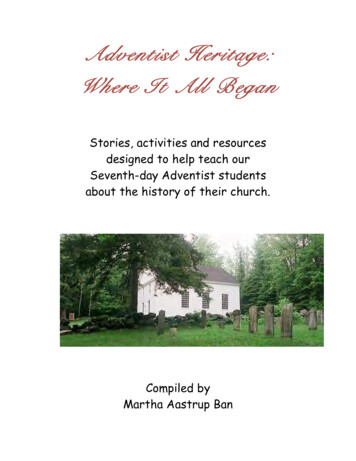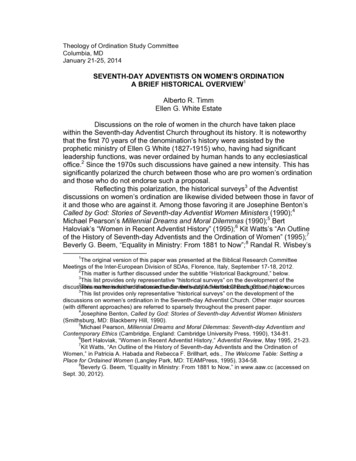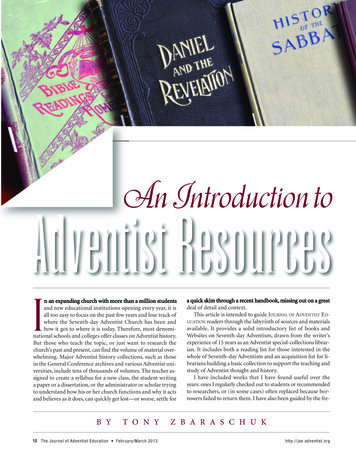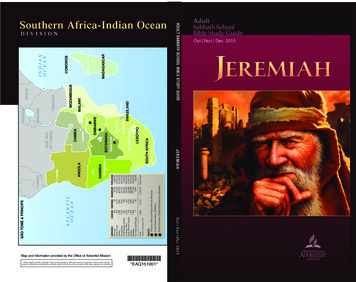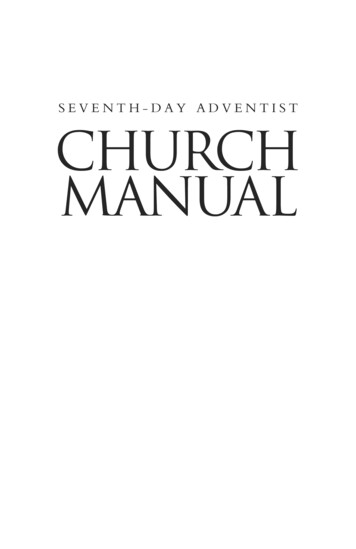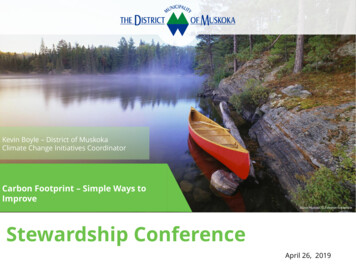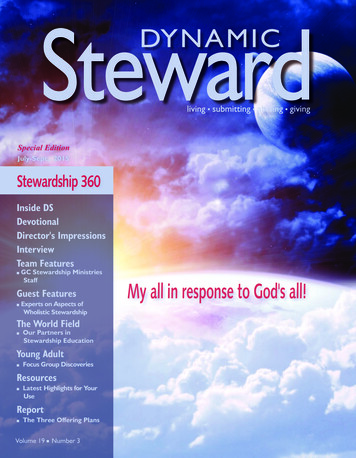
Transcription
Special EditionJuly-Sept. 2015Stewardship 360Inside DSDevotionalDirector's ImpressionsInterviewTeam FeaturesnGC Stewardship MinistriesStaffGuest FeaturesnExperts on Aspects ofWholistic StewardshipMy all in response to God's all!The World FieldnOur Partners inStewardship EducationYoung AdultnFocus Group DiscoveriesResourcesnLatest Highlights for YourUseReportnThe Three Offering PlansSteward 3VolumeDynamic19 n July-September,July-September,1
inside dsMy all in response to God's all!The Dynamic Steward grantspermission for any article (not areprint) to be printed, for use ina local church setting such as asmall group, Sabbath School, orclassroom.The following credit must begiven: Used by permission of theDynamic Steward. Copyright 2015.Specific permission must beobtained for any other use.The Dynamic Steward is publishedquarterly by the StewardshipMinistries Department of theGeneral Conference of Seventhday Adventists .12501 Old Columbia PikeSilver Spring, MD 20904 USATel: 1 301-680-6157Fax: 1 dsEDITORLarry R. EvansEvansL@gc.adventist.orgASSISTANT EDITOR/GRAPHICSPenny BrinkBrinkP@gc.advenitst.orgEDITORIAL ASSISTANTJohnetta B. FlomoCONTRIBUTING EDITORS:James BaduWilliam BagambeAniel BarbePaolo BeniniBhupal ChadanshiveMichael HamiltonKwon JohngHaengPavel LiberanskyJohn MathewsJavier Mejía MejíaMario NiñoMiguel PinheiroDanijela SchubertHappy SibilangErika PuniEDITOR'S NOTE: The articles in this publication have beenrevised slightly or updated to conform to the intended audienceand nature of the Dynamic Steward. Unless otherwise stated, theNew International Version of the Bible is used.2July-September,April-June,20152014 2015July-September,October-December,2014Jesus: The Prodigal StewardFrom all appearances Jesus was a prodigal.He is the Creator of all and the King of theuniverse. He was adored and worshipped bya multitude of angelic beings. He is not only Life,He is the source of life. He is, after all, God. Itis only natural to read the Bible as if it were firstabout us. Scripture does tell us that, “God so lovedthe world that he gave His one and only Son” thatwe might “not perish but have eternal life” (John.3:16). At center stage, however, is God. We dohave a tendency to put ourselves in the center ofthings. From Genesis 3 to Revelation 22 we reada story of a loving and determined God who hasan overwhelming desire to get His exiled familyLarry R. EvansAssociate Director,back. The lengths to which Jesus went to reclaimGC Stewardship MinistriesHis lost family would certainly appear to makeHim a true prodigal. The sacrifices He made on our behalf reveals the depth of Hisinvitation for us to become stewards of His grace (1 Pet. 4:10).The dictionary meaning of the word “prodigal” is not wayward but rather“spending money or resources freely and recklessly; wastefully extravagant.” Itincludes the idea of spending until there is nothing left. The word certainly fits theyounger son in Luke 15 who foolishly spent his inheritance on that which did notlast. The term, I believe, can also apply to the Son of God. Given all that He hadprovided for us in Eden, followed by our rejection of His gifts while continuing toenjoy all the benefits, it would be logical to conclude that He was reckless with anyinvestment in us. He “made himself nothing” (Phil. 2:7) that we might not onlybe “something” but that we might be restored to being “children of God” (Rom.8:16). Such a sacrifice in light of our past history clearly makes Jesus appear as “theprodigal steward.”When a newspaper posed the question, “‘What’s Wrong with the World?’ G.K. Chesterton reputedly wrote a brief letter in response: ‘Dear Sirs: I am. SincerelyYours, G. K. Chesterton.’” (Timothy Keller, The Prodigal God, p. 53). Such aninsight and attitude recognizes both our fallen state and the ultimate sacrifice of Jesusfor us. It is from this perspective that biblical stewardship draws its strength, itsmotivating power and its ability to tap into ministry opportunities Christ has madeavailable for each of us.In this special issue of the Dynamic Steward we will take a brief 360 degree lookat stewardship. Biblical stewardship addresses the whole person—who God is, whowe are and what we have. Left there, however, stewardship would be incomplete.The missing part of that equation is “others”. We have been invited by the sacrificeof Jesus to also be prodigals, so that others might experience His grace in their lives.We, in turn, are blessed as they receive. “Whatever necessity there is for our agencyin the advancement of the cause of God, He has purposely arranged for our good.He has honored us by making us co-workers with Him. He has ordained that thereshould be a necessity for the co-operation of men, that they may keep in exercise theirbenevolence” (Testimonies to the Church, Vol. 3, p. 390). Such is the opportunity setbefore us by the One who gave all.Editorwww.adventiststewardship.com
devotionalLWhat Is in Your Hand?ast Christmas my family was privileged to visit the Sight and Sound theatresin Pennsylvania, USA, to watch the “epic” Story of Moses. It began withMoses’ mother, Jochebed, weaving a basket for Moses and letting him downinto the Nile River. Soon afterwards, Pharoah’s daughter pulls the basket out of theNile and saves him. Moses grows up in the palace while his people, the childrenof Israel, are oppressed. He realizes his Hebrew heritage and feels uneasy in thepalace. Finally, he chooses to be with the slaves.For forty years, Moses had lived as a prince of Egypt. Then one day heintervenes on behalf of a Hebrew slave and kills an Egyptian slave master. Nowa murderer, Moses flees for his life to the desert. In one day, he transitions from aprince to a wanted fugitive.As I sat through the presentation, I began to wonder: What would I havedone? Would I have renounced the royal throne? Would I have left the walls of thecomfortable palace to struggle in the desert feeding sheep?Then the Lord spoke to Moses from the burning bush (Ex. 3:7-10) telling himthat He cares about the suffering of His people and wants him to deliver them butMoses understood his flaws. At least four times, Moses tells God that He must bemistaken. “Who am I for such a task?” “How can I convince them?” “Nobody willbelieve me! Please, send somebody else.” Moses found good reasons not to go (Ex.3:11, 13; 4:1, 10)“What is in your hand?” the omniscient and omnipresent Lord asked.Sarcasm? No. He wanted Moses to acknowledge who the true Godis.“A shepherd’s rod,” Moses replied."Throw it down,” said the Lord.“Throw it down?” (Ex. 4:2, 3).Once a Prince holding a scepter, now a shepherd tendingsheep, the staff was all he possessed. It was his new identity andhis sole income. It protected him from danger. It also represented Moses’potential. Given to God, He would use it to perform miracles.Moses could not become the man God wanted him to be until he agreed tothrow down the staff, his prized possession and trust God. Showing Moses thatHe was more powerful than any Egyptian god, the Lord told Moses to pick up thesnake by the tail. That day in the desert was a decisive moment for Moses. Whatabout us?If we would like the Lord to change the course of our lives and mold us, wemust release what’s in our hands. We may never meet God in a burning bush or freea nation from slavery, but He is calling us to drop what’s in our hands and allowHim to shape us for His service. This call is for all of us.Johnetta B. FlomoAdministrative Assistant,GC Stewardship MinistriesOn the day of the ceremony, Ivan andhis soldiers stood, in full armor, in thewaters of the Mediterranean Sea, readyfor baptism. The king of Greecerealized that they couldn’thave two identities—beingboth warriors and GreekOrthodox. So they hastilysettled on a solution. Asthe priests immersed eachone, they would keep justtheir sword arm above thewater! The ceremony wasnicknamed “the unbaptizedarm.”Jesus made it clear,“No man can serve twomasters” (Matt. 6:24). ManyChristians today also havean unbaptized arm.Some have not totallysurrendered their allto God. What is inyour hand?Unfortunately, some find it hard to let go of all they possess. Returning onlya portion of their income to God often seems difficult enough. It is easy to focuson our needs and neglect to trust Him. If only we would believe that our heavenlyFather can supply all our needs according to His riches in glory!Ivan the Great, the 15th century Russian Czar, did not have time to start a family.His comrades encouraged him to get married and found him a wife—the daughterof the king of Greece. To marry her, Ivan had to be baptized as “Greek Orthodox”.Dynamic 4July-September,July-September,3
conceptDirector's Impressionsthe way they sacrifice to make a difference in their families, the church and thecommunity by pledging themselves to be faithful stewards of the Kingdom allseven days of the week and twenty-four hours of every day. This is whole-lifestewardship.Affirmation of Wholistic StewardshipWhile we’ve been mindful of and committed to bringing in God’s financialresources through tithe and offerings, we were determined to focus on teachingand promoting stewardship as a matter of spirituality, which finds its center inJesus. This wholistic approach with the goal of helping people to experience Christpersonally as a transforming power has been well received and appreciated by ourmembers around the world. We praise God for this! As we’ve watched peoplegrow in the grace of Jesus, we have also noted growth in their giving in all things.Stewardship is all of me in response to all of God.Erika F. PuniDirector,GC Stewardship MinistriesMy experience and journeywith the General ConferenceStewardshipMinistriesover the last ten years has been oneof spiritual discovery and growth.It has been an amazing journey andan absolute privilege to witness whatGod has done and continues to do inthe life of His global church throughthis ministry. As I reflect back on theseyears of partnership with many ofour leaders, both within the GeneralConference headquarters and withthose serving in the world fields (13divisions, MENA and the Israel Field),I’m thankful as well as humbled by theunfathomable grace of God. He hasmade it possible for us as a team to beHis instruments of grace for the world.Stewardship as Total Church MinistryMore then ever, I’m convinced that stewardship, as a fundamental belief of thechurch, is everybody’s business and mission. Stewardship is a multi-disciplinaryministry and a collective calling of the entire Church. I’m impressed with the waywe are now seeing individuals and ministries around the world working towards acommon goal—to make disciples of all people. As we move into the future, I’menvisioning a church where our older members will come together and team upwith young people in teaching Christian stewardship as a spiritual discipline and asa way of life. This is a vision of the present.Stewardship—It’s About TeamworkThe church is the body of Christ and Stewardship Ministries is a family and a team.I’ve been impressed with the giftedness, and blessed by the dedication and tirelessservice provided by my team here at the General Conference, both in the office andin the field. I’ve grown through their love and counsel and have become a betterperson and leader because of them. This special edition of the Dynamic Steward isdedicated to all of them: Mario Niño, Larry Evans, Penelope Brink and JohnettaFlomo. I thank God every day because of you.Deeper CommitmentAs I’ve traveled to support andencourage God’s Church everywhere,I have been impressed with the levelof commitment among our leadersand church members who give fullyof themselves in service to God. I’mnot just thinking of their dedication toworship and personal witness, or theirgiving with regards to their personalfinancial resources. I’m thinking of4July-September,April-June,20152014 iststewardship.com
team featureRediscovering Stewardship!Ibegan my journey in stewardship ministries in 1969, and I have worked full timefor thirty-seven years in this ministry. During all these years, I have heard differentconcepts of stewardship. Ideas developed through the years. In the interest offinding the original meaning of stewardship, I was led to investigate the Scriptures,both in the Old and New Testaments. While the books of the Old Testament (OT)were written in ancient Hebrew, the books of the New Testament (NT), were writtenin Greek.Original Languages Shed LightBruce Corley in his book, Intertestamental Perspective of Stewardship (1971,p.16) states that an adequate concept of stewardship must be based on the semanticsof the group of words in the original language. Since the OT was written mostly inancient Hebrew, and the NT in Greek, it was necessary for me to clarify the conceptas it appears in these languages and then compare it with the concept that has beenpoured into the modern languages. The word oikonomía comes from the commonGreek and describes the responsibility assigned some to direct, manage or be incharge of the house of his or her master.Because oikonomía (stewardship) did not begin, nor is it defined, in the NTbooks, I had to search the OT in order to know where and when stewardship began.Finally, I found reference to it in the book of Genesis. Moses records that on thesixth day of creation, God (Elohim) said, "Let us make man in our image (selem);let them have dominion (radah) over the fish of the sea, over the birds of the air,over the cattle, over all the earth and over every creeping thing that creeps on theearth" (Gen. 1:26).ResponsibilityAccording to James Strong in The Dictionary of Hebrew and Aramaic Words(2002, p.123), the word radah (dominion) which appears in the original text, meansto "direct, dominate, subdue, rule, govern." A careful reading of chapters 1 and 2of Genesis finds that Adam and Eve were to direct or manage five things: 1. Theworld, 2. Life, 3. Family, 4. Resources, and 5. Time appointed by God.A valuable insight I gained is that stewardship is not an optional responsibilitythat we can accept or leave at our convenience. Whether or not a human being has areligious affiliation, believes or does not believe in the existence of God, agrees ordoes not agree with God, stewardship is still his or her assigned responsibility forwhich God will hold everyone accountable. It was a responsibility assigned beforethe creation of humans; it was defined by God, before human beings were created,and before the formation of religious organizations.Mario NiñoAssociate Director,GC Stewardship Ministries.and they shallhave dominion.stewardshipAccountabilityDuring His earthly ministry, Jesus clarified this duty through the parable of theunjust steward, where He reports that, "There was a rich man who had a stewardwho was accused of wasting his possessions. And he called him, and said, Whatis this I hear about you? Give an account of your stewardship, for you can nolonger be a steward" (Luke 16: 1, 2). It affirms that God will demand an accountof mankind’s responsibility. He will require every human being to give an accountof their management of the world, their life, family, resources and time. Failure totake this responsibility seriously has led to a loss of the original biblical concept ofstewardship and a loss of the privileges that are included in it.Dynamic 4July-September,July-September,5
interviewTowards Wholistic StewardshipErika F. Puni (EFP) inverviewed byLarry R. Evans (LRE), DS Editor.Dr. Erika Puni (Ph.D.), is the Directorof the GC Stewardship MinistriesDepartment.LRE: You haven’t always been instewardship ministries. How did thatchange come about?EFP: It came as a surprise. I wasteaching applied theology at AvondaleCollege in Australia when I was invitedby my division to lead the StewardshipMinistries, Sabbath School and PersonalMinistries in 2000. Then I was calledto lead the GC Stewardship MinistriesDepartment in 2005.LRE: You speak about wholisticstewardship. What does wholisticstewardship mean to you?EFP: My understanding of wholisticstewardship comes first from theGenesis account where God presentsthe concept of creatorship and invitesthe first humans to continue Hismanagement. From this I understand itto mean that we are stewards of the totallife rather than stewards with a limitedor conventional6July-September,April-June,20152014 ing of finances. The second idea supporting wholistic stewardship alsocomes from the Genesis account. If “rule over”(Gen. 1:26, 28) means that Christrules through me, then I also connect that with the call of Jesus for me to seek thekingdom of God. This means that Christ reigns and has dominion in my personallife. I don’t believe this is limited to only my finances. It’s a call for my total life asChrist’s steward.LRE: Why do you think whole-life stewardship is so important?EFP: Traditionally, life is viewed from a compartmentalized perspective dividingthe secular from the spiritual. I think God views life as a whole. I hear Jesus talkingabout this wholistic understanding of stewardship when He responded to the question,“What’s the greatest commandment?” He comes with a relational response by saying,“Love the Lord your God with all your heart and with all your soul and with all yourmind and with all your strength” (Mark 12:30). I see that as addressing the totalperson. When Jesus rules my life, He desires to be in control of my entire life—notjust a part of me. Stewardship becomes wholistic when in its broad sense it becomesan imitation of God; when I allow Him to rule and to control my whole life.LRE: So if stewardship is more than finances, for example tithe and offerings,what else does it include?EFP: If stewardship is my total response to God, then my total life will includemy worship of God. It will include my influence in society at large and in the localcommunity. It would include my relationship with other beings outside of myself.It would include, for me, my attitude toward the things of life called possessions,whether that be the job of creating things or accumulating things. I think even thatis included. There’s no question that finances do come under the total picture ofstewardship. Then, of course, one can add other subsystems of our human experience.Such things as language, and the arts, would be included. All should come under therule of Christ.LRE: Do we have any indication that this wholistic approach is making adifference in the financial giving?EFP: Yes. There are exciting stories coming from the South American Division andsome of the African divisions where this approach is being applied with significantsuccess. There are also places in Asia where this approach is being implemented, andthe life of the Church is being enriched beyond tithe and offerings. It is making a realdifference.LRE: With such a broad view of stewardship, how does it relate to other ministryareas of the church?I often illustrate this point with a colorful pizza. I see pieces of the pizza as categoriesof our human experience. Stewardship is likea ministry platform of thechurch where allof us,www.adventiststewardship.com
interviewirrespective of what ministry, i.e., Personal Ministries, or Sabbath School, or HealthMinistries, for that matter—all of us minister to bring men and women, boys and girls,to experience Christ both as Lord and Savior. I don’t think that is the responsibility ofany single department. All of us are called to do that.LRE: You speak about stewardship as if it is impacted by both internal andexternal forces. Are there two levels of stewardship?EFP: No, I don’t think so. I do believe that as humans we live our lives on two levels.Sometimes I use the imagery of a tree or a plant where there are roots, and there arethe fruits. And while these are two different levels, so to speak, they are part of the onereality. So it is with stewardship—there is the inner or deeper level of our being andthere is the outward manifestation of stewardship in terms of actions or behavior. Thetwo are connected, I believe with one informing the other.LRE: So stewardship involves my reaction to the world around me, such as theenvironment?EFP: Yes, but I probably would prefer the word “response to.” I’m not just reactingto something. It is part of my calling as a Christian steward to take care of all of thison behalf of God. Our God-given values, then, begin to inform who we are and whatwe are to do? Yes and I believe there’s biblical support for that. When Christ takesHis rightful place in our life, when I accept Him as my Savior and Lord, somethingtakes place within, whether we call it transformation or conversion. That somethingdoes not stay within myself. It will be expressed outwardly, in terms of what I do—mybehavior. Transformation is an initiation of God and He works within me.LRE: So what we do in the Stewardship Ministries Department is not somethingwe initiate. We work as partners with God to facilitate and explain His initiation.Is that what you are saying?EFP: Yes, it’s part of the total process and experience.LRE: Is it possible for a faithful steward to live in this world but not be dictatedby the secular values of this world?EFP: I think of Jesus’ prayer in John 17 where he says in verses 11 and 12 “HolyFather, protect them” from the world. I think that part of our calling as stewards is tobe like “yeast” in society, to be “light” in the world. How can I continue to manifest thelife of a faithful steward despite the context in which I find myself? This is where ourpersonal choice comes in. We must continually submit to the values of the kingdomof Christ and allow Him to be Lord of our life. Joy enters into life as we remainconnected with Him and, of course, worship is an important part of this experience.LRE: With this view of a wholistic stewardship, how do you see tithe andofferings fitting into this big picture?EFP: If we accept the wholistic understanding of stewardship, then we wouldalso accept that finances are a part of our human life and Christianexperience. If we allow Christ to be the ruler of ourlives then we return tithe, not becauseGod needs it but because He isDynamic Stewardthe Creator and Owner of everything.It expresses in financial terms who Godis. It is about worship. Offering, on theother hand, is an expression of gratitudefor the blessings of God and the gift oflife, and especially for Christ, His Son.Our stewardship, then, is God-centeredbut it is also sensitive to the needsaround us. Stewardship is also a call tocare for the less fortunate of society, thepoor. I think Jesus makes it very clearwhen He said to the disciples, “The poorwill always be with you.” And of coursewe find God speaking to His people inthe Old Testament about it. Financialstewardship includes our support forprojects and initiatives for people evenoutside of the church who, for whateverreason, have special needs. God is callingus to act responsibly towards them.LRE: In view of what you have shared,what can each administrator and eachstewardship director do to encouragefaithful stewardship among ourmembers?EFP: First, I think as churchadministrators, we have a responsibilityto talk about stewardship in our personalconversations and to teach whereopportunity is given. We should leadby example by demonstrating our ownfaithfulness to God both in tithe andofferings. In other words, there is aplace for education, but there is also aplace for inspiration and encouragementthrough personal example. Stewardshipbecomes a way of life and not just aprogram that is being 4July-September,July-September,7
the world field56124GLOBAL STEWARDSHIP EDUCATIONIn this quinquennium (2010-2015)alone, the General Conference StewardshipMinistries in partnership with the 13 divisions,and MENA, was able to provide stewardshipeducation and training in 85 countries, in alladministrative levels of the Church and selectededucational institutions through esses, seminars, camp meetings, andevangelistic campaigns.In 2014, a Stewardship Ministriesonline conference reached 83 countries withnearly 5000 log-ons. The 24 presentationswere interactive and translated, live, into fourlanguages. These video seminars are availableonline, free, to individuals and groups whowish to continue stewardship education wherethey are. (See the resource page for details.)The Stewardship Ministries Directors inthe world field are our partners in stewardshipeducation, and the division directors share theirperspectives on stewardship on the next page.831North American Division2Inter-American Division3South American Division4West-Central Africa Division5Trans-European Division6Inter-European DivisionJuly-September,April-June,20152014 iststewardship.com
the world field11615109121478137East-Central Africa Division810Israel Field11Euro-Asia Division12Southern Asia Division13South Pacific Division14Southern Asia-Pacific Division15North Asia-Pacific DivisionDynamic StewardSouthern Africa-IndianOcean Division9Middle East-North Africa uly-September,July-September,9
partners' perspectivesDivision Stewarship Ministries Directors1North American Division: John MathewsGod’s stewards live in a world of chaos and brokenness but live a life of contentment. To do so, they are filled withpractical wisdom that is governed by practical sanctification. This is seen in our daily lives as we manage the tangibleand intangible possessions entrusted to us for God’s glory. How we apply God’s salvation is on display to the churchand community. When successful, those around us see a picture of a loving God that has confidence in His people.2Inter-American Division: Javier MejíaA Christian steward is a person who has internalized the vision of the Kingdom of Heaven in his/her heart.This results in a decision to consecrate all he/she has on the altar of service for the vision to be accomplished.Through a living relationship with Jesus Christ, the steward lives totally committed to this cause. It is thisrelationship that enables the steward to consistently produce the fruit of the Kingdom for the glory of God.2aInter-American Division: James Daniel (Associate)The biblical concept of a steward carries the idea of being a servant or agent. Therefore, a steward is a servantwith an authority that resides in the Master/Owner who delegates the authority. The steward acts in place of theOwner, managing His property with reference to the Owner’s will. By doing so, the steward contributes to humanlife and the environment which is under his/her management for the Owner-God (Gen 1&2; 1Chron.29:14).3South American Division: Miguel PinheiroA Christian steward is a person who has developed the habit of seeking God in the first hour of every morning andthen remains in communion with Him throughout the day by submitting all of life to the control of the Holy Spirit. Itis then that power and wisdom are received for managing and sharing the steward’s resources for God. The stewardis faithful to the principles of Christian stewardship as an expression of love to our gracious Savior.4West-Central Africa Division: James BaduA Christian steward is a believer who acknowledges God as Creator and Owner. The steward, through the Lordshipof Jesus Christ, surrenders every area of his life to Him. Being a steward means living a life of total and fullcommitment to God because of the love He has shown. This includes having a personal relationship with Him basedon love and a growing intimacy. It also means being faithful in all that has been entrusted in one’s care.5Trans-European Division: Michael HamiltonTo be a steward, it is essential to acknowledge and respect the true Owner and one’s property. A Christian steward knowsthat God owns all things and that it is an honor and privilege to be given the responsibility of working alongside Him topreserve His assets. Secondly, stewards are trusted people and as such, there is generated a deep sense of responsibilityand endearing gratitude. This leads to an even greater commitment to the work of stewarding the ‘property’ of God.”6Inter-European Division: Paulo BeniniWe are each created in the image of God and in Him we find our sense of identity. As God’s specialdelegates on this earth, we are given the responsibility of ruling (Gen. 1:26) in ways that would pleaseGod who is the Owner of all. Satan has sought to destroy what God has made. Nevertheless, as stewardsaccept their accountability to the Creator and participate in His mission, they are recreated into His image.6aInter-European Division: Corrado Cozi (Associate)Stewardship is God’s invitation to manage our Christian life in a balanced, concrete and comprehensiveway. The Lord’s call for us to sanctify the Sabbath, for example, is an invitation to be a steward ofour whole life including our financial resources, relationship with others as well as the environment.Being a faithful steward is living according to the divine purpose that God has set before us.10July-September,April-June,20152014 iststewardship.com
7East-Central Africa Division: William BagambeTo be a steward is to love the Lord God with all your heart and with all your soul and with all yourmind and with all your strength.”(Mark 12:29, 30), and to do everything only for His glory (1Cor.10:31).8Southern Africa-Indian Ocean Division: Aniel BarbeGood stewards acknowledge their status and responsibility as created beings: w
Jesus: The Prodigal Steward. F. rom all appearances Jesus was a prodigal. He is the Creator of all and the King of the universe. He was adored and worshipped by a multitude of angelic beings. He is not only Life, He is the source of life. He is, after all, God. It is onl
